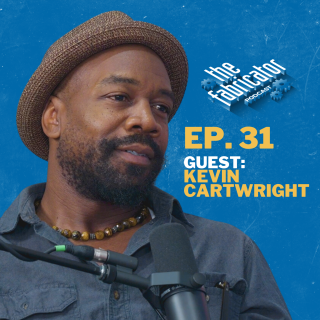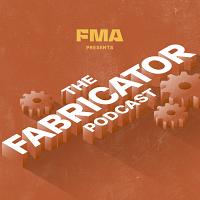How a longtime artist became an inner-city Detroit welding instructor
Kevin Cartwright had a very nontraditional path to becoming a welding instructor. The longtime Detroit-based multi media artist, working under the name Nivek Monet, spent years painting before turning his attention to metal sculpture art. That led him to working in various metal fabrication shops to learn how to weld. Eventually, he became the lead welding instructor at Randolph Career and Technical Center, a Detroit high school focused on teaching skilled trades.
In this episode of The Fabricator Podcast, Cartwright joins host Dan Davis and guest host Darla Welton to talk about his journey from artist to welder to teacher, his time working in metal fabrication shops, his artist moniker Nivek Monet, his philosophy when it comes to skilled trades education, his involvement with Skills USA, being featured in a Carhartt commercial, and creating abstract sculptures out of scrap metal.
Email us at podcast@thefabricator.com with any comments, questions, or suggestions.
In This Episode
Learn more about FMA's Coil Processing Workshop and Tours
Register for FABTECH 2023.
Learn more about Randolph Career and Technical Center
Learn more about Kevin Cartwright's art
TRANSCRIPT
Kevin Cartwright: I did a commercial with Carhartt, where I was this spray painter in this commercial, and I showed the students, "Check this out." And I'm so excited, because I'm in a commercial.
Darla Welton: For Carhartt, yeah.
Kevin Cartwright: And they're like, "Oh, okay. Yeah." I said, "How many of your teachers are in commercials? How many people do you know that are in a commercial?" It's just like, "I don't know." It's like, "Okay, the modern student, boy."
Dan Davis: You're working for the toughest audience every day.
Sara Spring: FMAs Coil Processing Workshop heads to Toledo. During this two day workshop, you'll connect with industry colleagues and gain insight into your toughest processing challenges. The small group setting includes facility tours for you to see equipment in action and discover new solutions for cutting, slitting, leveling, safety, and more. For more information and to register online, please visit fmamfg.org.
Dan Davis: Hello, this is the Fabricator podcast. I'm Dan Davis with the Fabricator Magazine. Darla Welton, still Building America series on the fabricator.com blog, as well as a partner of Brown Dog Welding with her husband and friend, Josh Welton, who's at Military Welding Certification Camp. We appreciate your being here today.
Darla Welton: Love it.
Dan Davis: Today's conversation will be with Kevin Cartwright of Robinson. Did I just get that name right? Did I screw that one up too?
Darla Welton: Randolph.
Dan Davis: Randolph, man. Randolph Technical Career Center here in Detroit. There's only one mistake so far for those of you scoring at home. Kevin has a real good tale of working with kids, introducing them to welding, welding skills through his interest in art. So it's kind of this intersection of two very interesting paths, and he's done it very effectively, and we spent a good amount of time talking about his experience, bringing the kids to the USA-
Darla Welton: SkillsUSA.
Dan Davis: SkillsUSA Welding Competition, and really enjoyed some conversation. But we also delve into some of his interest in doing art. And he's currently, as we're taping this, having an exhibition at an art gallery, which led me to think, when's the last time you set foot in an art gallery?
Darla Welton: Honestly, we try to go as often as we possibly can.
Dan Davis: But you run in a pretty creative circle of friends.
Darla Welton: We do. And Josh does lots of metal art. He actually has, his art is going into a show this weekend and all proceeds from that show go to a group in Detroit called Design Connect, and they work with younger students, and it is sort of in the art world too. So that's being put on by our friends, Ralph and Doris Shields, and they support a lot of the art community and all sorts of different things. But yeah, so I mean, art is kind of a big part of our life and what we do. And we love going to, I mean, Detroit is full of awesome little galleries, down alleyways and some of the coolest shows we've been to have been off of the back of a meat shop in Eastern Market.
Dan Davis: Wow. Yeah. Wow.
Darla Welton: You can find them everywhere. They're such a cool creative community. Some are really big and out there. And you go into Eastern Market, you have 150 outdoor murals that are all huge on the size of the buildings. I mean, they're everywhere in the city, but yeah, awesome art community, awesome creative spirit, whether it's big or underground here. So yeah, we go and we see stuff all the time or make art galleries, destinations, wherever we go.
Dan Davis: Yeah, I don't run in those circles. My wife had one cousin that did some art in her spare time. I think that's probably the last time I attended something like that. I will say it was a very nice time taking it all in. And there's hors d'oeuvres, there's refreshments.
Darla Welton: Indeed.
Dan Davis: I don't know what more there is to like.
Darla Welton: There's food and beverage and interesting things to talk about.
Dan Davis: Yes. Interesting people as well.
Darla Welton: Exactly. Very interesting people. We even have artists who have their living areas of their homes or their galleries and they hold shows in their homes. Yeah, pretty cool.
Dan Davis: So I think you'll enjoy this conversation with Kevin. He's kind of soft-spoken, but he's very thoughtful and sometimes you don't need a whole lot of words to get a point across. I prove that every time I'm on this thing. So please watch this episode and enjoy it.
Sara Spring: FABTECH North America's largest metal forming, fabricating, welding, and finishing event is back in Chicago this September 11th through the 14th. See the latest technology, gain insights from industry leaders and discover strategies to grow your business. Register for free today@fabtechexpo.com. And now back to the episode.
Dan Davis: Today we're being joined by Kevin Cartwright, a friend of the Weltons, and Kevin is the program lead at Randolph Career and Technical Center. I want to make sure I didn't flip those words. We're going to chat about some of the work he's doing there and his take on vocational education. Talk about some of the things his students have been up to, because I think that's been some pretty exciting stuff. And the Weltons have kind of shared some of Josh's activity participating in the USA Skills Welding Competition.
Darla Welton: Yeah, actually it's funny, because today's the first day that Kevin and I actually met. We met his students at the SkillsUSA Competition, and the other gentleman who is the lead for the Welding Sculpture Competition, he told us about Kevin as well as his students also spoke so highly of him. They love you, they adore you, you really inspire them. And so, we're like, "We got to meet this guy."
Dan Davis: Nice to have a hype crew, hey.
Kevin Cartwright: Look, I saw the judges coming up and I just had to walk off. Let me let these guys stand on their own two feet and just let them be without me lurking. And then you get in this false sense. "Wait a minute, he put them up to this, didn't he?" "Nope, I'm out of here."
Dan Davis: So were they competing? So just give everybody an idea of SkillsUSA Welding Competition. They have local, state and national I think.
Darla Welton: Yeah, Local, state, national, I think there's an international competition too.
Dan Davis: Oh, maybe, so.
Darla Welton: Not every school metal sculpture has never been a part of the Michigan competition. It has been a part of the national level competitions, I understand. This was our first year being involved with SkillsUSA at all, but it's something we've wanted to do. So when Jeff Seelye, who was in charge of the metal sculpture program, reached out to us, asked if we wanted to participate in being judges, we were so excited, because we were like, "Finally, all right, now we're in." We get to be connected with this, this is really cool. It's important to us to connect with and inspire and give opportunities to young people who are interested in the trade or who wouldn't get opportunities to explore it otherwise. And so, there were only a few entries.
Dan Davis: Right, but it's somewhat new though, correct?
Darla Welton: Yes. Yeah. And we were just blown away mostly by the personalities and the maturity of the kids and how prepared they were to speak on their project, how highly they spoke of one another, how you pulled them together to create this sculpture. Correct me if I'm wrong, but you had an AM class and a PM class and they came together to create this sculpture. And you would've never thought that half of those kids had never met before when you saw the actual sculpture. Actually, we just had, I saw it come up on the Fabricator, Josh wrote an article about it. I think it just came out two days ago. I'll send that to you too.
Kevin Cartwright: Please.
Darla Welton: Just bragging on your kids and your program. And so, we were kind of just blown away, and yet we didn't actually get to meet Kevin, just his students. And it was funny, because we were really bummed, because as Jeff had explained, you were really excited when you saw the metal sculpture program, so you just sort of ran with it. But their sculpture actually broke some of the rules of the competition. And so, all of us agreed, technically they should have been disqualified, but we just couldn't do it, because the sculpture and what they pulled off as a group was so fantastic. We pushed them through.
Dan Davis: That's awesome. That's awesome. I like flexibility.
Darla Welton: Which is great. Yeah.
Dan Davis: So have you been involved with SkillsUSA.
Kevin Cartwright: Well, to piggyback, this was my first year too as an instructor. I'd gone out to look at the competitions and whatnot, but when sculpture was added, I figured, this is it, this is it, I was so excited, I just put everybody to work, "This is it, we're making a sculpture, get to it." It was three weeks where we had to really produce this thing. And man, I didn't think to read until I got there. That's so crazy. I did.
Dan Davis: From my perspective, it's all about getting it to the place. So maybe that was my only concern.
Kevin Cartwright: And my wife said, "So you didn't read the instructions, huh?" I'm like-
Dan Davis: This is so stereotypical. You realize that and the fact that it still worked out for you. The fact that your wife's reminding you is the go right in, chef's kiss.
Kevin Cartwright: Because she's normally the reader, man, whenever we buy anything, she reads everything. She's the one to stand there and say, "Wait A goes to H."
Dan Davis: That's awesome.
Kevin Cartwright: And I'm like, "You weren't there, babe, to read it. I'm sorry," but I had to take all the heat. I pulled the guys aside and I really let them know that I dropped the ball. So, "Hey, you won. You made it out here. You've already won. You get to experience this." And from what I can take back, they experienced it on a high level. They really enjoyed being there and just being the center of attention like that was a good thing for those guys.
Dan Davis: You think a project like that really kind of galvanizes, they may have an interest, but it even galvanizes it even more, being that it's like a creative outlet. It's their stamp kind of being shared with the public.
Darla Welton: Yeah, look at this, it's Black Panther.
Dan Davis: Wow.
Darla Welton: It's so cool.
Dan Davis: That's cool. That's a lot of movement.
Darla Welton: Yeah.
Kevin Cartwright: I'll share this, that one of my guys was coming over from carpentry and the question with him all year was like, "Gabe, will you be back next year? Will you be back next year, to welding that is?" And he's like, "I don't know. I might do something different." After going to this competition, the guy at the end of this year had them clean out their lockers. Gabe was like, "Can I just leave my stuff, my lock on my locker and leave it here for next year?" And I'm like, "God, he is [inaudible]. Of course you can, Gabe."
Dan Davis: Yeah, that's awesome.
Kevin Cartwright: Yeah, so that was a real good pat on the back for me there.
Dan Davis: How long have you been involved with the teaching of welding?
Kevin Cartwright: Five years? Ever since my hiring at Randolph, in which I have another funny story that I didn't want to go for this job, okay? Because I'm an artist at heart and I was doing pretty cool with my art. And a friend of mine says, "Hey, they got this position at Randolph for the lead welding instructor and special, why don't you come with me and you can be the special, I'll be the lead?" This guy. We get to the school for this interview. I'm like, "I don't want to go in, babe. I just, I don't want to go in." We're on a podcast, so I'll beep, think of us, said, "If you don't get out of here, get in there, get that interview." I'm like, "Okay." They're normally things you don't want to do and they just fall on your lap, those are the things. So I wouldn't look back. I wouldn't have traded it. It was-
Dan Davis: That's awesome. Did you have a background in welding?
Kevin Cartwright: Yeah. Yeah. I come out of, I weld under Faulks Welding and Fabrication Shop. I used to work with the guy, Joe Bommarito, Addison Iron. Joe used to always tell me, "You're not a welder, you're an artist, you're not a welder." I'm like, "Okay, all right." So I take that into my class these days and get them pepped up.
Dan Davis: That's funny.
Kevin Cartwright: "I'm a welder."
Darla Welton: Is that over on Mac, Addison Iron was?
Kevin Cartwright: Addison Iron used to be on Vernor.
Darla Welton: Vernor. Yes. Yep. I drive by there all the time. Yep.
Kevin Cartwright: Yeah.
Dan Davis: That's great. And did you ever think you would end up in education?
Kevin Cartwright: I've been teaching art for quite a few years. I used to teach art at Denby High School.
Dan Davis: Oh, okay.
Kevin Cartwright: I started that in 2013 through '15. I've done CCS art classes. We used to do the art outreach, so they did a whole special project where they trained the artists to be teachers, as opposed to artist teacher. And then we went and did these afterschool classes.
Dan Davis: Everybody's got a separate tale of how they end up where they are.
Kevin Cartwright: I'll tell you, it's never the same.
Darla Welton: It's so crazy. I love it.
Kevin Cartwright: I got to own it. I'm really an art teacher and I use the welder as my instructional tool.
Darla Welton: Which is fantastic though, because obviously this was a metal sculpture competition. But were your students also there for welding competition at all, or strictly for art?
Kevin Cartwright: Strictly for the art.
Darla Welton: Okay. I have to say, because when we do the interview portion, we have to really drill them on the fabrication side of things and their welding knowledge. And they were well-prepared. They knew quite a bit for, especially in the short period of time that most of them have actually been welding, we were really impressed. So whatever knowledge you do have and experience you do have, you are clearly just passing that along and they're eating it up and they're really absorbing it and making decisions and having thoughts about their futures based on it, which was really obvious when we did our interviews with them. So I'm actually really impressed.
Kevin Cartwright: Well, thank you. You're impressing me with just hearing this because-
Darla Welton: You weren't there for the interviews. I wish I could have recorded those interviews. Josh and I both said that we're like, "Oh my gosh, these kids are blowing us away with..." And they would be honest. They say, "Well, I don't really think I'm considering a career in welding, but I am thinking about how cool it would be to have a welder at home that I could keep playing around with or try different processes." So that in and of itself is really cool, just having that opportunity. And we know opportunity is lacking in our city, and there's only two tech high schools in the city, and Randolph is one of them. Jeff communicated with me that you shared there is one MIG welding machine, one stick welding machine, and a plasma cutter for one of two tech high schools in Detroit.
Dan Davis: Oh, wow.
Darla Welton: Detroit, the industrial Mecca of the world.
Kevin Cartwright: Wait, wait. You know what? Hold on, hold on.
Darla Welton: Okay. Do we need to clarify this?
Kevin Cartwright: Wait, we do, we do.
Darla Welton: Okay. Okay. Good, good, good.
Kevin Cartwright: We do.
Darla Welton: It's a little bit, it's not as bleak as I was thinking.
Kevin Cartwright: It's not as bleak.
Darla Welton: Okay. Good, good, good.
Kevin Cartwright: We do have 14 booths. So it's still limited, but there's 14 booths that are outfitted with multiprocessing machines. What I think was the guys were translating was that they worked with one welder, one plasma cutter to produce that panther. Everybody kind of worked together on that one thing and then near the end and pulled in another machine. So you had a couple different folks welding.
Darla Welton: Okay. That's good to know.
Kevin Cartwright: I mean, when I read this, I was like, "Oh-oh, well, I'll just clarify it later."
Darla Welton: Perfect, perfect. That's great.
Dan Davis: But I'll guess you're always open to any maybe donations.
Darla Welton: But do you have any TIG machines at the school?
Kevin Cartwright: We do have three TIG machines. The problem with that is that we never got our gas. See, that's part of our problem is-
Darla Welton: Consumables.
Kevin Cartwright: Getting the consumables in-
Darla Welton: Is an issue.
Kevin Cartwright: On time. It takes a year, two years in advance. Yes. Yes. That's an ugly thing. And I'll probably be reprimanded if they heard me say that.
Darla Welton: That's all right.
Kevin Cartwright: It's what it is, yeah.
Darla Welton: It's an issue.
Kevin Cartwright: It's a rough thing.
Darla Welton: That makes it tough. You have to get really creative with what you do and the time that you allow for each student to be on machines.
Kevin Cartwright: Yes. That is a challenge, which brought me to that project that had everybody working together. I just kind of put people in positions to do certain things and everybody came together in the end.
Dan Davis: Well, it seems like they're learning the basics of welding while doing something kind of creative. So it's not necessarily a traditional approach to maybe skills' development.
Kevin Cartwright: Yes. I have to stick to the book, because we have a core curriculum to follow. It's just I kind of weave me into the patch.
Dan Davis: Instead of a on coupon, maybe they're working on this piece.
Darla Welton: You have to. Yeah.
Kevin Cartwright: Yeah. Well, they got their benchmarks that they have to, they got to complete those benchmarks in order to get their certificates. So I got to stick to those rules. But like I say, I weed in my artists, because that's how they really get on fire for the welding program under me.
Dan Davis: So I am married to a math teacher and as an educator, you know that flavor of the month in terms of how you're going to teach and all this, and one of the things they went through five years ago was co-teaching, trying to bring in the science people with the math people or something like that. And we were kind of talking previously in another episode about how welding and art go hand-in-hand. And with this, you've got the science aspect of it. You're talking about consumable gases and all this other stuff. It really, vocational training has a place in schools, and it's not even career readiness, which is now the flavor of the day, which is good, because I think skills are important, but do you see that? Do you see this combination of welding being just a part of a overall well-rounded education?
Kevin Cartwright: I see that especially in our environment as you were speaking. I like to bring as many of those different trades together from bricklaying to carpentry, our painting and decorating. We also have electrical there and plumbing. So what I would do is for some of those things like the brazing and or the soldering, I would link up with these other instructors so that they would get a chance to go into those environments and see how welding actually fits in that particular trade. And/or we do this final project where I try to bring the different trades together to create, we've done work tables, benches, you name it, functional art. We got this huge R on the outside of the building.
Dan Davis: Functional arts is a good phrase.
Kevin Cartwright: I tell you, it's all art first, and then I got to squeeze welding in. But no, I really try to slather that information on that everything fits together. It all fits together. For Gabe, as I was mentioning, he's coming from carpentry, so now he's getting this feel for welding, and he's like, "Whoa, okay. Welding." He did a banister with carpentry where he can see where welding would work on a carpentry site.
Dan Davis: Yeah. We've done a couple episodes with some furniture makers and just one of them came from with no experience at all, and the other one came of it from an interest in trees. And it's crazy. Once again, no linear path. They're just, people kind of end up where they are. Do you see these students branching off and kind of doing their own thing? Or will some follow kind of a traditional path and maybe go to work for a manufacturing company?
Kevin Cartwright: I'm going to say that, because of me and because of how I lead my own life and it's going to spill over, I'm really active in the art. So I'm always sharing things I've done over the summer when I start with my new classes. And then as we go, they get to know me and they really get like, "Wow, you did this and we can do this." And the whole piece is showing them that you can do whatever you put your mind to. So I try to drive that home. You can do it whatever it is you want to do, as long as it, I mean, you can do negative too. I was going to say, as long as it's positive. You put your mind to negativity, you're going to do it, but as long as you put your energy and time and that effort into making things happen, you'll make it happen.
Darla Welton: Yeah. So Kevin, did you go to art school?
Kevin Cartwright: You know what? My story is the path of least resistance in a sense. My mom told me to always do what you love. I love drawing. So with that, I felt like I can draw pretty good. I don't need to go to college for drawing. To go to college would be for something to add to the artist. Okay, I made all the way to an adult. I'm talking 30, and now I'm going to go to ITT. I'm going to study computer-aided drafting.
Darla Welton: Oh, wow, that's awesome.
Kevin Cartwright: I need to put the computer with the artist now. And I was working on a project where we did this amphitheater and I had to design the whole landscape and everything, and I figured that falls right into place and racked up a nice 30 grand to find out that ITT was not even-
Dan Davis: Accredited.
Kevin Cartwright: Accredited. Thank you. So I was lucky to be able to get that one cut off me. But imagine I go all this way keeping debt off. I studied under artists in their studios, basically. You get a lot of information when you're hungry and you kind of just are focused on what you're doing. So I've been very fortunate, very blessed to just kind of mold this person in here.
Dan Davis: Don't underestimate. Yeah, don't underestimate hustle. And just learning from others.
Darla Welton: Learning from others.
Kevin Cartwright: It'll take you a long way. If you are actually dedicated and hungry to what you're doing, it would take you far. I'm an example.
Dan Davis: Yeah, non-traditional path.
Kevin Cartwright: The non-traditional. That's right.
Darla Welton: Yeah, but it's funny, because it's non-traditional, but it sort of is like that apprenticeship path of learning-
Dan Davis: Informal apprenticeship.
Darla Welton: Yeah, informal apprenticeship, learning from others, absorbing everything that others have learned, and applying that to what it is you want to do with that thing. I see more and more of that with people that we talk to who actually, Mitch, the next guy that we have coming in, he learned welding from another guy. He was just like a dude working in restaurants and just wanted to try something new, wanted to change, and just started working under him the first packaging boxes and then wanted to play with fire. But I just feel like I see more and more of that, because school is so expensive, and that's kind of how things were traditionally done, trades and everything.
Kevin Cartwright: Exactly.
Darla Welton: I love that was a path for you. Informal though, like you said. Yeah.
Dan Davis: Do you see your students kind of embracing that thinking, having seen maybe parents still paying off student loans or seeing what other kids have gotten themselves into?
Kevin Cartwright: I think this question is the thing that's gotten me in trouble with the iron workers, one of our partners at school.
Dan Davis: Yeah. No, yeah. You have these relationships.
Kevin Cartwright: And it's my background that really, I can push what I know. You push what you know. And yes, I think they will embrace that, with exceptions.
Dan Davis: And that's the balance. And I think that's the onus that's on employers now, whether unionized or non-unionized, is that they've got to create an environment that engages the workers. And that's the thing I hear from smaller shops that have found some success in trying to keep people around is that they can't promise them the world in terms of pay. So they got to make sure it's interesting and they move them around. And frankly, it ends up better for the company, because if someone's out for the day, someone can jump on this particular machine or this process. So I don't know. It seems like the kind of worlds are finding each other a little bit, hopefully. I'm not sure if I'm ancient. So you're more in touch with the younger state of mind. So you find that there's an awareness of welding now, as people get involved in kind of getting exciting projects, do they talk amongst their friends?
Kevin Cartwright: Oh, yeah. In fact, it's funny you'd mentioned that. I had a guy, a senior that left. Once you graduate, you're out of there, you're gone. You're not going to get this kid back for another day. Well, this guy was so into his project, his final project that he made it back. He made it back, finished it, it was a sunflower he was making that he wanted to leave at his high school western.
Dan Davis: Oh, wow.
Kevin Cartwright: And the guy made it in there the last day, which was Friday, finished up his sunflower and took it up front and impressed the principal, I mean, feeling pretty good again. But I got to give credit to the approach, because I make it fun. I make it fun. And when you see the results and the fun you're having, I mean, hey, why wouldn't you go back and finish the project and leave your mark someplace else? Which then, I'm sorry, man.
Dan Davis: Oh no, go ahead.
Kevin Cartwright: The students to see that project, "Where'd you get?" "Randolph, I went to Randolph." "Oh, I need to join that program over there. This is cool, man."
Dan Davis: Yeah, that's awesome. I mean, what else is going to last the ages other than a metal project? It's always the footstool the kid makes in woodworking in middle school that gets, it is not all the, "Why, I would like to be president." That stuff gets thrown out in the back of the artwork and all that other stuff.
Darla Welton: That is true.
Dan Davis: It's tangible. Tangible. I don't want to say it's permanent, but it's lasting. It's really cool.
Darla Welton: My parents still use the metal table that my brother made in metal shop in high school as well as the clock that he also made, but he made that in wood shop in high school, and they're still in the house. They use them every day. It's pretty cool. Yeah. I don't see any of my awards on the walls, so yeah.
Dan Davis: Do you have any goals for your program moving forward? I know you've mentioned school [inaudible]. Sometimes summer is time to sit back and just focus on yourself, but if you had an opportunity to maybe to look ahead.
Kevin Cartwright: I would say part of my goal is forging relationships with folks like Darla and her husband in order to actually bring more awareness basically, not only that, you're showing them different outlets, they get to see different methods, they get to see what they're doing and how it actually is affecting everything around them. So I would say forging more relationships is my goal. Get these relationships forward so you can get more support basically. And by having more support, the students are seeing that there's more opportunities.
Dan Davis: Is support easily delivered or is it a situation where if somebody want to donate coupons or scrap metal, what's the best way to make that happen for you?
Kevin Cartwright: I would say get in touch with me.
Dan Davis: Okay. Yeah. That to me is part of the forging and just being here for a couple of these interviews. There's a nice little community and you see that in other communities well, but people leaning on each other and making connections and it kind of energizes people involved in that community.
Darla Welton: Oh, definitely. We're excited. We couldn't quite pull it together before the end of the school year, but we'd love to have bring your students over to our shop, we're at Trumbull in 94, near the Wayne State football field. And yeah, we love opening our doors, our equipment. We have sponsors from Miller, we get Miller machines that are all top of the line. We really just got a cool plasma-cutting table, and we feel like, yes, it was given to us, but it's not ours. We want to use it in community. And we have so many machines, and there's only two of us. We can't use them all at once. So we hold welding workshops that are open to anybody, but we hold those workshops so then we can give free workshops to kids.
Kevin Cartwright: Understood.
Darla Welton: So we've worked with Wayne State students. We've worked with various Detroit High School students, kids that live across the street from us. I mean, that's why we do what we do so that we can just share the opportunity, learn, play with fire a little bit. Maybe kids will love it, maybe they'll hate it, but they'll have had the opportunity to explore it. So yeah, our doors are wide open for our community. For sure.
Kevin Cartwright: Well, I'll tell you that before I left school, I made sure that I had the guys on point for me to arrange a date with you through the summer.
Darla Welton: Perfect. Let's do it. Yes. I'm so excited. I was wondering if we were going to have to wait or if you were able to.
Kevin Cartwright: I wanted to stitch that together fast for them in their minds. That was a key point for them to get that invitation that really had them on, "Got invited to do TIG welding." So I'm like, I got to make sure that this glue sticks.
Darla Welton: We're ready for them. It is absolutely my favorite thing to do is to welcome people who haven't had that opportunity, try something new, watch them get excited when they try TIG for the first time or whatever process it might be, even if it's just blasting through metal with a plasma cutter, if they haven't done that. Oh man, I just watch people light up. It's so great.
Kevin Cartwright: It's the fire.
Darla Welton: It's like the tool of the gods.
Kevin Cartwright: It's the fire.
Darla Welton: And you've got it in your hands and you're just like, it's so awesome.
Kevin Cartwright: For tours, it's like just go over there and hit the MIG gun or start the striking arc, because it's just the fire. The people don't know what they're looking at, but they get fired up from looking at the fire.
Darla Welton: Exactly. What can I do with that? If I hone this element, what can I create? And then giving them the opportunity to create. There's just something, I mean, as an artist, there's just something magic about creating something and standing back and then being able to share it, whether it's a functional piece or just an inspirational piece, whatever that might be. Yeah. So cool. We'll definitely figure that out really, really soon. So yeah.
Dan Davis: Will you kind of follow the same thing you did this year with maybe participating in the metal sculpture project again with USASkills?
Kevin Cartwright: Yes, in fact, this time I heard it's a board that you can get on to kind of discuss rules and things like that.
Darla Welton: Yes.
Kevin Cartwright: So I'm definitely going to be striving to get on that board. I feel as though with us doing this group project that it opens the door for maybe that to be added.
Dan Davis: Okay.
Darla Welton: Josh and I are trying to advocate for that, because here it's supposed to be an individual competition with certain guidelines, and obviously you saw how big the Black Panther piece was, but this, I think they're supposed to be in a box-sized sculpture.
Kevin Cartwright: Foot by foot. Yeah.
Dan Davis: You know what? If you put it on its nose-
Kevin Cartwright: And I tell you this, I wasn't swift enough with my thoughts, but the head comes off. So we could have entered the head alone.
Darla Welton: Could've entered the head.
Dan Davis: It's a majestic beast. You don't want to decapitate it.
Darla Welton: I love how excited though the kids were to show us that the head comes off.
Dan Davis: Transformers, Panthers in disguise.
Kevin Cartwright: Mad. It was.
Darla Welton: Yes, yes.
Kevin Cartwright: I'm like 1', I think we're like 70' over specs.
Darla Welton: But it was so great. It was so cool. And the way that, honestly, one of the most, obviously the sculpture was really cool, and it was neat seeing people walk by and comment on it and just stop dead in their tracks and be like, "Whoa, look at that. That's so cool," because it was in a main hallway, so there was quite a bit of traffic. But the really neat part was hearing these kids talk about how they collaborated to create this. It was really something, and I can't remember exactly which students it was, but one was from the AM class, one was from the PM class. They had only met three days before to collaborate and finish up the piece. Yet they had this amazing comradery. There was something really special about the environment that you created for them. I would've thought that they had been friends for a few years. So I think that really speaks to your teaching skills and your leadership. But yeah, it was really a special thing for Josh and I to witness.
Dan Davis: It really is a desirable skill for employers. The ability to just work with other people.
Darla Welton: And their confidence.
Kevin Cartwright: That's important to work with others. That's what it's all about. That's what the spirit man is supposed to be reaching out to combine us all is the one that we are. So part of that glue is upon introduction. In my classes, we're a crew, so everybody AM and PM, we're all one crew. So I put them in that state of mind that they are one workforce together before they even get on a group project.
Dan Davis: Well, I know that the SkillsUSA, they do have that formal something they have to build up from print, but enabling that on the creative side as well kind of makes sense. Especially the thing I love about these pieces are the bigger pieces.
Kevin Cartwright: That's what I mean, sculpture, you figure it's supposed to be a big piece, without reading.
Dan Davis: I see a giant metal fish somewhere.
Kevin Cartwright: Without reading, this should be huge. If I just did fish, it'd be like, oh.
Dan Davis: You're preaching to the choir. I get it, man. Giant balls of yarn, size gets attention.
Darla Welton: Right, exactly, exactly.
Dan Davis: But it kind of makes sense. Good luck with that goal of having them adopt that. I think that's kind of a time worth spending.
Darla Welton: And obviously you're modeling that and your personal/professional life too. Let's talk a little bit about your art. So clearly Kevin doesn't go by Kevin as an artist.
Kevin Cartwright: I don't. Now I'm turning into my Superman mode.
Dan Davis: You split time between the two equally, or you favor one more than the other?
Kevin Cartwright: I would have to favor the teaching, because it requires so much computer book work, but you can't get away from who you really are. I wish I had more time to just pour into who I am, but I am so grateful that the little time I have is being used and being celebrated right now in that show.
Dan Davis: Do you jump into it when you have downtime, like the summer?
Kevin Cartwright: I have to.
Dan Davis: You make time.
Kevin Cartwright: Once school kicks off again, you got to put a Superman on the back burner. Little Nivek Monet goes to the back burner then. It's all Kevin Cartwright.
Dan Davis: That's awesome. Do your students know this dual identity?
Kevin Cartwright: Yeah. They get privy here and there. It's like who's going to catch on and who's not? I keep sort of that secret identity going on a little bit.
Darla Welton: Oh, I love that.
Dan Davis: Yeah. They don't want to want to give credit to their teachers of actually being human.
Kevin Cartwright: I mean, man, listen, I did a commercial with Carhartt, where I was this spray painter in this commercial, and I showed the students, "Check this out." And I'm so excited about it, because I'm in a commercial.
Darla Welton: For Carhartt, yeah.
Kevin Cartwright: And they're like, "Oh, okay. Yeah." I said, "How many of your teachers are in commercials, man? How Many people do you know they're in the commercial." It's just like, "I don't know anybody." It's like, "Okay, the modern student, boy."
Dan Davis: You're working for the toughest audience every day.
Kevin Cartwright: Oh my God.
Darla Welton: Oh my God.
Kevin Cartwright: I got to soften it up and turn into this whole fun place, man.
Dan Davis: No, that's awesome. That's awesome.
Darla Welton: Yeah. I absolutely love it.
Dan Davis: Do you share your art via social media as well? Do people, find some of that?
Kevin Cartwright: There's that forbidden place for me, social media. I mean, man, I have-
Darla Welton: You probably couldn't find much either.
Dan Davis: No. Yeah. What we found is your Instagram account.
Kevin Cartwright: I've got an Instagram, and every now and then I'll peek in Instagram and I'll drop something in there, and then something happened to where I wasn't on Instagram for a bit and I peeked in. I was like, "Ah, man, I don't even."
Dan Davis: They changed all the algorithms.
Kevin Cartwright: I don't even. And I understand how important it is to really, especially in this new internet world that we have, you can really go far with the social media following, and I just need a young mind probably to help me.
Dan Davis: Get one of your students to run your account.
Kevin Cartwright: Yeah, I got to do that. I got to get a youngster to kind of pick it up.
Darla Welton: Probably a good idea.
Dan Davis: I think that's a nice kind of summation of the relationship kind of in life in general.
Kevin Cartwright: Thank you. Thank you. Because there's always one or two that you got to get creative with. Thank you. I think I'm going to add that into my course.
Darla Welton: Good idea. Yes.
Kevin Cartwright: Thank you.
Darla Welton: Yeah.
Dan Davis: Social media literacy.
Kevin Cartwright: I tell you. Thank you.
Dan Davis: That's awesome.
Darla Welton: No, that's really good because I mean, there's a lot of Detroit artists who do really well on social media, so obviously we know all the really big names that have massive murals. And so yeah, we got to get you out there more. So I think that's why we're doing this here right now.
Kevin Cartwright: Well, thank you, I appreciate it.
Darla Welton: Having you on this podcast, it's so cool to have you be a part of our community, and we're excited to connect with you and likewise students more so.
Kevin Cartwright: I asked permission to hijack this podcast for my podcast that I was supposed to have been podcasting, I don't know how many years ago, and I've never podcasted.
Dan Davis: You were on a podcast before?
Kevin Cartwright: Man. No, this is my first one, and I got a link on my webpage that says podcasts.
Darla Welton: Well, you can link to this podcast.
Kevin Cartwright: Okay, good, good.
Darla Welton: Until you get yours going, and you're going to be like, "Look how awesome I am on podcasts."
Dan Davis: We get likely to-do list [inaudible].
Kevin Cartwright: But I got a few weeks ahead of me, so I should be able to iron out some good things to get me a good footing.
Dan Davis: That's awesome.
Darla Welton: Yeah. That's so great.
Gareth Sleger: So you said you worked in some fab shops. How did that influence your metalworking art?
Kevin Cartwright: Okay, so I'll give you my first fab shop was a studio called Proper Art Detroit. In that studio, I was tasked with making the armatures for the sculptures. We did 3D billboards there. So at the time, 3D billboards were a big thing, sculpted out of styrofoam, but they needed metals armatures to attach them to the boards. So because I was the guy, I got taught real quick how to weld by the previous guy, and that being in that art studio alone kind of contributed to just kind of the awareness of welders and how it merges with visual arts.
Gareth Sleger: It was just kind of trial-
Kevin Cartwright: Trial and error with that one. But then I got hired into Joe's shop, which was a little more than, you got to have this together. You got to really be fabricating, because the metal was on the forefront. That's what you're looking at, the handrails or whatever we're doing. We did some podium work. That stuff is right there in your face. You got to have it looking like it's supposed to look.
Gareth Sleger: So the art kind of influenced your fabrication career a little bit?
Kevin Cartwright: Yeah. The art is just the heart, unfortunately. It's all art, and you get this fabricated additive basically, and for me, working jobs, it would be how do you make art with this job to keep me together here? It's like I got to be doing something that's true to me.
Dan Davis: Right, that's cool. That aspect of it kind of reinforces, once again, the different type of environments. One can practice these skills.
Kevin Cartwright: Exactly.
Dan Davis: And people aren't made the same. So where somebody might not be able to find a home in one place, that might be the perfect place for somebody.
Kevin Cartwright: But I tell you, fabrication is the basis of everything. The more that I do what I do and I study more, it is just without fabricating, you don't have this couches sitting on the desk over there. It's all the heart of it. This building, the structure is fabricated. Then they bring in the bricklayers and everything.
Dan Davis: The same way. You're kind of looking at some weld beads. Where's that made?
Kevin Cartwright: I mean, I try to drive home with the students to clothes on your back, if it weren't for a welder, you wouldn't have sewing machines.
Darla Welton: It's so true. It's so true. And then you just become really judge-y of welds everywhere. I was on a pedal boat over the weekend and I'm staring at the welds like, "We're going to sink."
Dan Davis: I just joined the health club and I'm looking at the machines and I'm like, "Oh my God." It looked like the first time I tried it, the limited times I've done, I'm like, "Who is this person? They should not... Let's go find a robot." Dan at the gym, seeing a worker come over, "Do you need help with the machine?" He's like, "No, look at these welds."
Kevin Cartwright: That's it, man.
Dan Davis: Is this safe?
Kevin Cartwright: You do start looking at these.
Darla Welton: Josh and I visit lots of-
Dan Davis: In all honesty, I'm only pushing 90 pounds over head.
Darla Welton: I love it.
Dan Davis: We're not in extreme danger.
Darla Welton: Josh and I like to visit national parks and wherever they actually have railings, I mean, that's not really a big thing. Very dangerous area of national parks, no railings, but where they do have railings, they've been welded together. It's become our thing to take photos, and we were thinking of starting an Instagram account where we post photos of national park welds and it was like, die or not die? What will happen to you?
Dan Davis: That's probably a good place to have those questions.
Darla Welton: What's really cool though, is some of the really old welds that are probably from the thirties or forties are just these massive mega stick-welded.
Kevin Cartwright: Stick-weld.
Darla Welton: Yes, welded, just monster welds that are going to stay there for probably another 100 years.
Kevin Cartwright: So that was another thing that I learned at Prop Art was the drop test. Okay. If you can drop it and it doesn't break, you got a good weld.
Darla Welton: When people who sometimes look at my husband's sculptures, they'll be like, "Can I pick it up?" He's like, "Yeah, go right ahead. If you drop it, it's not going to break."
Dan Davis: Faberge eggs. That is not what we're talking about.
Darla Welton: Right, exactly, exactly.
Kevin Cartwright: One more thing. I'm sorry.
Darla Welton: Yes, no, please.
Kevin Cartwright: Speaking of the drop test, I've got a sculpture that looks like flames. Okay. I sold that to a client and they moved to Arkansas. Their house burned down.
Darla Welton: Oh, wow.
Kevin Cartwright: Okay. This piece of sculpture was hanging on the wall on their first floor basically. The house burns down, it drops to the basement. Okay. Now mind you, it's in this hot burning oven. They get me the sculpture back. This thing drops to the basement. It's in this fire. I get it back. It's all burned up, but it's together. So wait a minute. The point it dropped from the first floor into the basement on a concrete floor in a burning oven and held together.
Darla Welton: Oh, that's cool.
Kevin Cartwright: Now, before the fire. After the fire was all rusted out from being put out.
Dan Davis: Oh, yeah.
Kevin Cartwright: But they send it back to me to have it refurbished.
Dan Davis: Oh, wow.
Darla Welton: Wow.
Kevin Cartwright: And it was intact.
Darla Welton: How big is that?
Kevin Cartwright: That piece is probably 2' by 1'.
Darla Welton: Very, very cool.
Kevin Cartwright: Darla, if you look at my sculptures, they're probably going to be in spec for the competition.
Dan Davis: Because they're smaller.
Darla Welton: So are my husband's yes, yes.
Kevin Cartwright: I was so embarrassed, man, when I looked at this and I'm like, man, your sculptures are in spec. This is going to look bad.
Darla Welton: It's, we were so excited about what they did. It didn't even really matter. Yeah.
Dan Davis: Cool. Well, looking at your other pieces, what's some of your inspiration when it comes to the metal art?
Kevin Cartwright: The metal stuff? I have to let it form itself. So what I do is I used to teach adult education, so all the coupon work, all the cuts, all that scrap from the coupon cutting, I would collect it all and later create these pieces. Those are the bin tests you see here?
Darla Welton: Yes.
Kevin Cartwright: Those are bin tests, and I made, that was two, so that was Gemini for that particular show. But then the scraps from the coupons, if you roll up this one here were all the beads from your root burn. And I stacked them all up. So this is like running water basically, is what that's designed to be splashing.
Dan Davis: Like a splashing.
Kevin Cartwright: Yeah. The sculptures kind of form themselves. Like my paintings, you draw in a sketchpad and come up with an idea. The sculptures I draw after I sculpt them.
Dan Davis: Gotcha. Sure.
Darla Welton: I don't do any metal sculpture, I do paintings, but my husband does the metal art, and people are always like, "Well, can I see your blueprint? Can I see what you drew ahead of time?" He's like, "It doesn't exist." He's like, "It comes from the metal."
Kevin Cartwright: The metal. It's got to talk.
Darla Welton: I've watched him just stare at all the scrap metal on the shelves for a while, see one little weird piece, and that kicks off the entire thing. That's the one little piece that spoke to him and said, "Okay, I'm your cornerstone. So start from here." Yeah. Yeah.
Dan Davis: So just stream of conscious welding and formation of metal.
Kevin Cartwright: Yeah, you get like Darla said, you do have maybe a cornerstone piece, the one piece with the bent metal that came from Cobo Hall. The guy there knew I was a welder. I was working on the fresco with the Hubert Massey, and the guy brought me up this metal. He says, "I found this. This came from our door." It was like a threshold that somebody some [inaudible] it took it out of the floor. He brought up to me, "Hey, man, you want this?" "Hell, yeah!"
Darla Welton: Exactly.
Kevin Cartwright: And it formed into this piece to Octagon with this one here. That one right there.
Dan Davis: This one.
Kevin Cartwright: That one there.
Darla Welton: Oh, that's really cool.
Kevin Cartwright: Yeah, so that straight bar and that bent plate came from Cobo Hall.
Dan Davis: Wow.
Darla Welton: It's so funny, because most people just be like, "We got to toss this out, get this out of here." And then we're like, "No, no, no. We want that. We want that."
Kevin Cartwright: They tossed it out to the right can.
Darla Welton: We walk along the railroad. We have a railroad bridge that goes over Trumbull and Lincoln Street, and we walk along there, because we get so much scrap that falls off trains.
Dan Davis: Really?
Kevin Cartwright: Nice.
Darla Welton: Yeah. We have so many railroad ties, you should come. We could even walk up there when you bring the students. It's pretty cool.
Kevin Cartwright: That would be cool. Yeah.
Darla Welton: Yeah, we collect lots of neat stuff.
Kevin Cartwright: That's what it's about.
Dan Davis: When I was a kid, I would always be yelled at by old ladies telling me, "Don't take that, you're going to make the train derail." So I'm very wary if I'm near a train tracks first thing I'm looking for some old lady getting ready to yell at, "Were you taking the tracks off?"
Darla Welton: "No, dude, now we're moving tracks."
Dan Davis: "I'm just hanging out. As a matter of fact, if anything, I was probably grabbing a rock. I wasn't pulling the ties out of the rails." Literally, for a kid that didn't get in trouble, I was always in trouble. Wrong place, wrong time.
Darla Welton: I use railroad ties to hold down our blind strings. They just fly all over the place, so we have railroad ties sitting on the [inaudible] in the loft. They're great. Yeah. They're so cool.
Dan Davis: Well, thanks a lot for joining us today, Kevin. We enjoyed the chat.
Kevin Cartwright: Thank you for having me.
Dan Davis: And continued success, and if anybody wants to reach out and help you with the program, they can find you through, I think the Randolph Technical and Career Center website. Yeah. Awesome. If you're interested in the Fabricator podcast, please go rate, review and subscribe. Encourage your friends to subscribe to it as well, and if you have any questions, feel free and send them to the podcast@thefabricator.com. That sound good, Gareth?
Gareth Sleger: You nailed it.
Dan Davis: That's it. I just appreciate it. I'm just fishing for positive comments now. So let us know what you thinks and us any ideas you might have for a show or even possible guest, and we look forward to doing this again. Thank you and goodbye.
Sara Spring: The Fabricator podcast is a production of Fabricators and Manufacturers Association located in Elgin, Illinois. The show is hosted by Dan Davis and the staff of FMA Communications. The podcast is produced by Gareth Sleger and recorded and edited with the help of Brandon Geier, sales support provided by Andy Flando, additional production support by Elizabeth Gavin, Dana Wiker, Mary Diamond, Mike Owens, and me, Sara Spring. Thank you for listening.
ABOUT THE FABRICATOR PODCAST:
The Fabricator Podcast brings you conversations with people in manufacturing who make things out of metal. We speak with manufacturers, metal fabricators, welders, job shop owners, small business entrepreneurs, artists, marketers, educators, and more. Host Dan Davis also goes beyond discussing just manufacturing and the skilled trades, and chats about pop culture, current events, food, music, movies, comedy, and, of course, robots. The Fabricator Podcast is presented by the Fabricators & Manufacturers Association.
Host: Dan Davis
Producer/Editor: Gareth Sleger
Video Producer/Editor: Brandon Geier
Ad writer/spokesperson/social media: Sara Spring
Additional video editing: Dana Wiker
Graphics: Billy Kulpa
Marketing support: Elizabeth Gavin, Mary Diamond
Sales support: Andy Flando, Amy Hudson
Web support: Mike Owens, Jared Carlow
Additional support: Ed Youdell, Maurine Semevolos, Lincoln Brunner, Tim Heston, Rafael Guerrero, Josh Welton, Darla Welton, Amanda Carlson-Hicks, Callie Check, Rick Lehnhardt, Judy Steinbach.
Where to listen to The Fabricator Podcast:
Follow The FABRICATOR:
Where to Listen
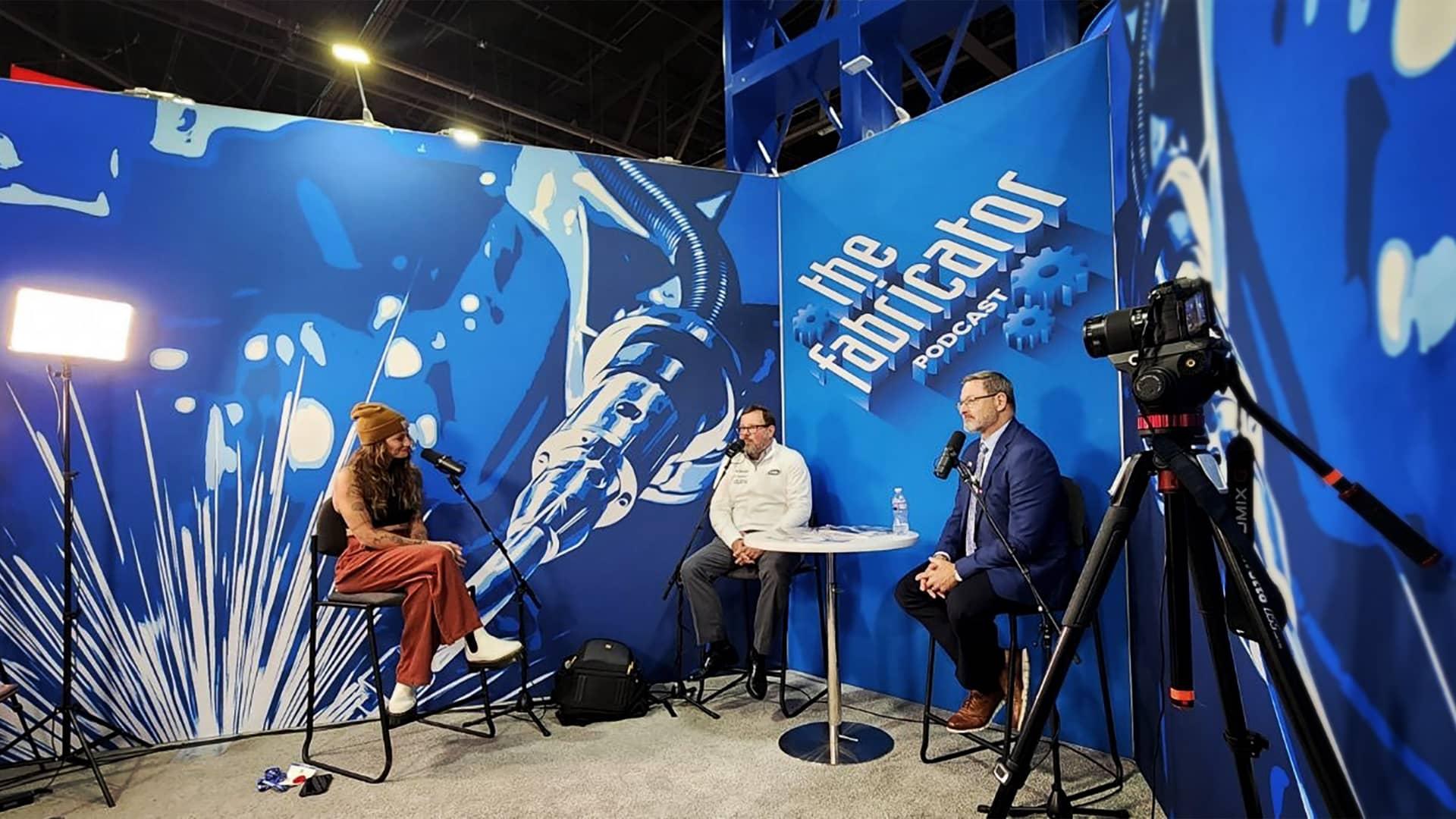
About This Podcast
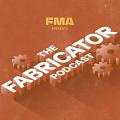
All Episodes
-
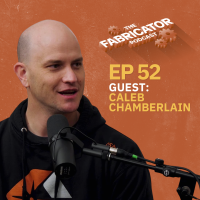 Ep. 052
Ep. 052 -
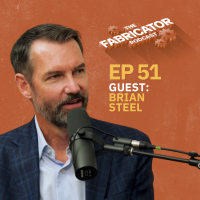 Ep. 051
Ep. 051 -
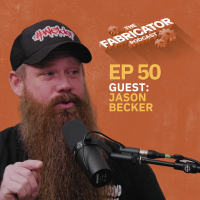 Ep. 050
Ep. 050 -
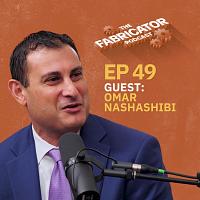 Ep. 049
Ep. 049 -
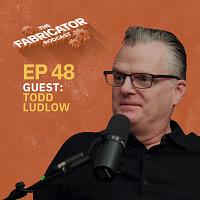 Ep. 048
Ep. 048 -
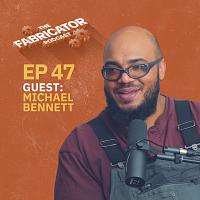 Ep. 047
Ep. 047 -
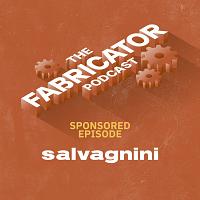 Bonus
Bonus -
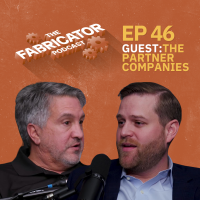 Ep. 046
Ep. 046 -
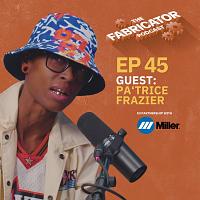 Ep. 045
Ep. 045 -
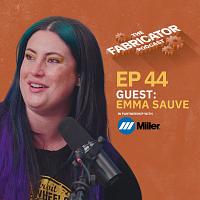 Ep. 044
Ep. 044 -
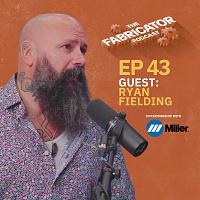 Ep. 043
Ep. 043 -
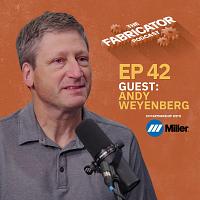 Ep. 042
Ep. 042 -
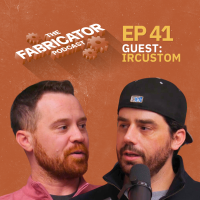 Ep. 041
Ep. 041 -
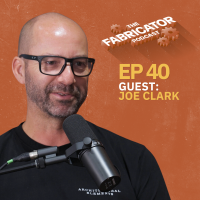 Ep. 040
Ep. 040 -
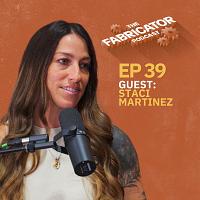 Ep. 039
Ep. 039 -
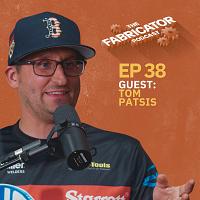 Ep. 038
Ep. 038 -
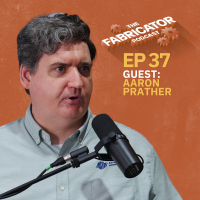 Ep. 037
Ep. 037 -
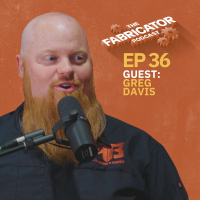 Ep. 036
Ep. 036 -
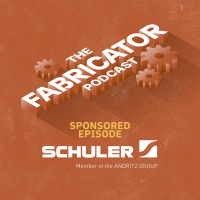 Bonus
Bonus -
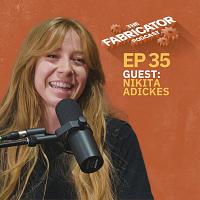 Ep. 035
Ep. 035 -
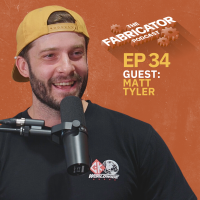 Ep. 034
Ep. 034 -
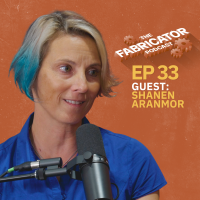 Ep. 033
Ep. 033 -
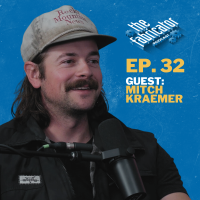 Ep. 032
Ep. 032 -
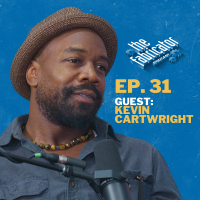 Ep. 031How a longtime artist became an inner-city Detroit welding instructor
Ep. 031How a longtime artist became an inner-city Detroit welding instructor -
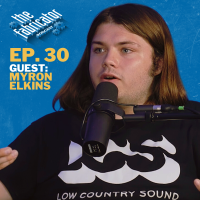 Ep. 030
Ep. 030
























